|
|
|
Sort Order |
|
|
|
Items / Page
|
|
|
|
|
|
|
| Srl | Item |
| 1 |
ID:
181069


|
|
|
|
|
| Summary/Abstract |
On March 4, 2020, members of India’s indigenous communities, known as Adivasis (i.e., original inhabitants), gathered at Jantar Mantar—an iconic protest site in New Delhi—to register their objections against the Citizenship Amendment Act–National Register of Citizens–National Population Register (CAA–NRC–NPR). The protesters, who came from different parts of India, opposed them mainly on three grounds.
First, they were concerned that a large segment of Adivasis may not be able to prove their citizenship due to the lack of identification documents and, therefore, could lose their citizenship.
|
|
|
|
|
|
|
|
|
|
|
|
|
|
|
|
| 2 |
ID:
181080
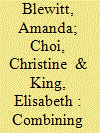

|
|
|
|
|
| Summary/Abstract |
How can political science classes best prepare undergraduate students for the field of peace and conflict studies (PACS)? We argue that well-designed experiential learning activities provide opportunities for students to embrace complexity and practice adaptability, fusing the theoretical and practical in ways that prepare them to engage in PACS. This article presents one such experiential learning approach: a conflict analysis activity. Through engaging in a messy learning process, students (1) gain an increased theoretical understanding of the complexity of conflict, (2) practice adaptability, and (3) increase their self-efficacy. We provide a step-by-step description of the Conflict Analysis Tool exercise and reflect on how well the activity enables the use of knowledge and skills relevant for PACS. Our goal is that the insights gained through our approach will be helpful to other educators—from PACS to international relations to American politics and beyond.
|
|
|
|
|
|
|
|
|
|
|
|
|
|
|
|
| 3 |
ID:
181079


|
|
|
|
|
| Summary/Abstract |
Teaching and learning in higher education is occurring, unavoidably, within the broader civic context of today’s extraordinarily polarizing political times. We seek to help students situate themselves with respect to and, above all, thoughtfully assess others’ as well as their own perspectives on issues of profound contention, without contributing to exacerbated polarization ourselves. Specifically, we offer students in our first-year exploratory political science course a vital tool—critical rigor—for navigating but not being inundated by the storm. This article discusses our experiences in teaching the course titled, “The Worlds of Politics,” as we attempt to help students deeply engage in cognitive processes of critical thinking and analysis, without undue infringement from their own—and least of all our own—personal political biases. Our focal learning objective is the cultivation of critical-thinking skills that promote students’ drawing of distinctions between advocacy and analysis, as well as their discerning civic engagement.
|
|
|
|
|
|
|
|
|
|
|
|
|
|
|
|
| 4 |
ID:
181067


|
|
|
| 5 |
ID:
181064


|
|
|
|
|
| Summary/Abstract |
The public health crisis of COVID-19 has compounded preexisting crises of democratic stability and effective governance, spurring debate about the ability of developed democracies to respond effectively to emergencies confronting their citizens. These crises, much discussed in recent political science, are joined by a further crisis which complicates and reinforces them: A migration crisis. Widespread travel and immigration restrictions instigated the largest and fastest decline in global human mobility in modern history, and COVID-19 may fundamentally change immigration over the longer term.
|
|
|
|
|
|
|
|
|
|
|
|
|
|
|
|
| 6 |
ID:
181081


|
|
|
|
|
| Summary/Abstract |
Political polarization and generational politics are important topics in contemporary political science classrooms. This article presents an approach to teaching political polarization in an introduction to politics course. Coauthored by two Generation Z students from the course and their Boomer Generation professor, the article provides conflicting views of young people and politics as found in the work of Robert Putnam and Russell Dalton. The article presents survey data on affective and issue political polarization from the course, including discussion by the two student coauthors of the survey results interpreting their generation’s political polarization. The course approaches the introductory politics course using cognitive psychology concepts including confirmative bias, motivated reasoning, and other cognitive biases. Teaching from this micro-level perspective helps students to reflect on their own political biases. The article provides concepts and readings for political science professors to use in replicating the course.
|
|
|
|
|
|
|
|
|
|
|
|
|
|
|
|
| 7 |
ID:
181071
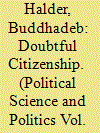

|
|
|
|
|
| Summary/Abstract |
Within days of passing the 2019 Citizenship Amendment Act (CAA), the Indian government allocated 39.4bn rupees (£427m) for updating the National Population Register (NPR) database (BBC 2019). Updating the NPR database is regarded as the first step toward a nationwide National Register of Citizens (NRC), which will enumerate all Indian citizens. The government’s determination to conduct a countrywide NPR exercise as part of the 2021 Census provoked doubts about its real intention because, with the passage of the CAA, religion has become a criterion for expediting the acquisition of Indian citizenship. Indeed, India’s Home Minister, Amit Shah, outlined the chronology (Dowerah Reference Dowerah2019) linking the NPR, NRC, and CAA with characteristic (BJP 2019) clarity: “Please understand the chronology. First, we will bring the CAA.
|
|
|
|
|
|
|
|
|
|
|
|
|
|
|
|
| 8 |
ID:
181074


|
|
|
|
|
| Summary/Abstract |
Citizenship in India has been the subject of “contentious politics” for decades (Aminzade et al. Reference Aminzade, Goldstone, McAdam, Perry, Tarrow, Sewell and Tilley2001). Incorporating citizenship within the framework of Indian federalism and the role of federalism in responding to varied citizenship claims is not without challenges. Indian states, which constitute India’s federal framework, are central to the complex negotiations that have shaped ideas of citizenship in the country. It is not surprising, therefore, that the amendments to India’s citizenship laws have been fiercely contested not only by protestors on Indian streets but also within legislative assemblies in several state governments, which are the basic units of governance in India’s federal democracy.
|
|
|
|
|
|
|
|
|
|
|
|
|
|
|
|
| 9 |
ID:
181072
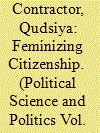

|
|
|
|
|
| Summary/Abstract |
Almost from the moment of its promulgation, the amendments to India’s citizenship laws have generated protests across the country. The images of a young Muslim woman student from Jamia Milia Islamia who stopped a policeman from assaulting a male student and the crowds of women gathered at a Delhi neighborhood called Shaheen Bagh are now etched in public memory. The image of resistance to the newly introduced Citizenship Amendment Act (CAA) has become that of a Muslim woman holding the national flag and a portrait of Bhimrao Ramji Ambedkar, the architect of the Indian Constitution. Younger Muslim women have been active in expanding support to the peaceful protests through social media and a door-to-door campaign to create awareness of the need to resist the CAA. Many of these women are first-time participants in a public protest that has spread nationwide, as Muslim men continue to support them from the side lines.
|
|
|
|
|
|
|
|
|
|
|
|
|
|
|
|
| 10 |
ID:
181073
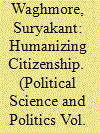

|
|
|
|
|
| Summary/Abstract |
In December 2019, Ramchandra Guha, a renowned liberal historian in India, was briefly detained in Bangalore for protesting against the Citizenship Amendment Act (CAA). When he was arrested, Guha was holding a placard with an image of Bhimrao Ramji Ambedkar, the architect of India’s constitution, and a message that read, “CAA against Constitution.” A few weeks later, Chandrashekar Azad, a prominent BahujanFootnote 1 activist who took to the streets against the CAA, was arrested and jailed for several months. Azad had carried a copy of the Constitution of India with an image of Ambedkar at all of his rallies and protests against the CAA, claiming that the current government led by the Bharatiya Janata Party (BJP) wants to demolish samata (equality) and samajik nyay (social justice)—both promised in the country’s founding document.
|
|
|
|
|
|
|
|
|
|
|
|
|
|
|
|
| 11 |
ID:
181078


|
|
|
|
|
| Summary/Abstract |
This article explores the differential impact of the COVID-19 pandemic on the productivity of male and female academics and whether the ongoing health crisis will exacerbate further the existing gender gap in academia in both the short and long terms. We present early evidence of the pandemic’s disproportionate effect on women’s research productivity using online survey data supplemented by interview data with regional and international female political scientists. The interviews and survey findings reveal gender disparities in perceived research productivity and service workloads during the pandemic. The results also shed initial light on the pandemic’s impact on the research productivity of academics who are parents, especially among women.
|
|
|
|
|
|
|
|
|
|
|
|
|
|
|
|
| 12 |
ID:
181075


|
|
|
|
|
| Summary/Abstract |
In 2017, the American Political Science Association (APSA) Committee on the Status of Graduate Students in the Profession launched an initiative to lower the cost of Division (i.e., organized section) membership for students to promote graduate students’ professional development and to advance Division interests. This article assesses the effect of this intervention on Division membership. Using APSA membership data, we find that almost two thirds of Divisions that charged fees in 2017 reduced or eliminated student fees between 2017 and 2019, nearly halving the average student dues (i.e., from $11.57 in 2017 to $5.84 in 2019). As a result, average student membership increased by more than 300% in Divisions that reduced fees (i.e., from 79.5 in 2017 to 248.7 in 2019), compared to a marginal 30% increase in those that did not reduce fees. These outcomes of the initiative support additional efforts to reduce the costs of APSA participation for graduate students.
|
|
|
|
|
|
|
|
|
|
|
|
|
|
|
|
| 13 |
ID:
181082


|
|
|
|
|
| Summary/Abstract |
This article addresses three related questions. Does voicing a political ideology in class make a professor less appealing to students? Does voicing an ideology in class make a professor less appealing to students with opposing views? Does the intensity of professors’ ideology affect their appeal? We conducted survey experiments in two public national universities to provide evidence of the extent to which students may tolerate or even prefer that professors share their political views and under which conditions these preferences may vary. Results from the experiments indicate that expressing a political opinion did not make a professor less appealing to students—and, in fact, made the professor more appealing to some students—but the perception that a professor’s ideology is particularly intense makes the class much less favorable for students with opposing views. Students are indifferent between moderately political and nonpolitical professors.
|
|
|
|
|
|
|
|
|
|
|
|
|
|
|
|
| 14 |
ID:
181065


|
|
|
|
|
| Summary/Abstract |
Campaigns, parties, interest groups, pollsters, and political scientists rely on voter-registration lists and consumer files to identify people as targets for registration drives, persuasion, and mobilization and to be included in sampling frames for surveys. We introduce a new category of Americans: the politically invisible—that is, people who are unreachable using these voter and marketing lists. Matching a high-quality, random sample of the US population to multiple lists reveals that at least 11% of the adult citizenry is unlisted. An additional 12% is mislisted (i.e., not living at their recorded address). These groups are invisible to list-based campaigns and research, making them difficult or impossible to contact. Two in five Blacks and (citizen) Hispanics are unreachable, but only 18% of whites. The unreachable are poorer than the reachable population, have markedly lower levels of political engagement, and are much less likely to report contact with candidates and campaigns. They are heavily Democratic in party identification and vote intention, favoring Obama versus Romney 73 to 27, with only 16% identifying as Republicans. That the politically invisible are more liberal and from historically marginalized groups shows that the turn to list-based campaigning and research could worsen existing biases in the political system.
|
|
|
|
|
|
|
|
|
|
|
|
|
|
|
|
| 15 |
ID:
181070
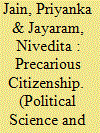

|
|
|
|
|
| Summary/Abstract |
In January 2020, residents of a slum in the suburbs of Bengaluru city (Karnataka State) found their homes razed to the ground by the city’s municipality. At the receiving end were internal labor migrants,Footnote 1 who routinely face such harassment in the cities to which they move for work. Although such evictions are a mainstay of contemporary urban life in India, this particular demolition caused an unusual stir because it reeked of the ominous politics of India’s new citizenship laws. The event was triggered by a viral video shared by a local resident that portrayed the slum as an unhygienic and “illegal Bangladeshi settlement.”
|
|
|
|
|
|
|
|
|
|
|
|
|
|
|
|
| 16 |
ID:
181066
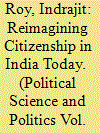

|
|
|
|
|
| Summary/Abstract |
In December 2019, the Indian Parliament amended India’s citizenship laws. Under the provisions of the Citizenship Amendment Act (CAA), Hindus, Buddhists, Jains, Christians, Sikhs, and Zoroastrians from its Muslim-majority neighbors Afghanistan, Pakistan, and Bangladesh will have their applications for citizenship fast-tracked. By explicitly omitting Muslims, Jews, Bahais, and atheists from its purview, the CAA introduced a religious filter that attacks the secular principles enshrined in the constitution. People from the six listed religious communities who entered India before December 31, 2014, were now eligible to apply for citizenship, with residence requirements reduced from 12 years to six.
|
|
|
|
|
|
|
|
|
|
|
|
|
|
|
|
| 17 |
ID:
181077


|
|
|
|
|
| Summary/Abstract |
Considerable work assesses research productivity in political science. Yet, the latter work has not explicated how research careers can differ across time and individuals and neither has it considered such careers in teaching institutions. This article presents an empirically validated typology for research career paths for political scientists who began their career in a teaching institution. The typology demonstrates that many scholars follow paths different from the most conventional expectations, and research “success” by measures of publications and citations is associated with only some of those paths. Thus, existing research on aggregate publications and citations likely addresses only a subset of the career paths described here. Understanding research activities in our profession requires accounting for various career paths, their motivations, and their place in our research community.
|
|
|
|
|
|
|
|
|
|
|
|
|
|
|
|
| 18 |
ID:
181076


|
|
|
|
|
| Summary/Abstract |
The snowball sampling method (SSM) is one of the most widely used methods to collect information about hard-to-reach populations and in low-information contexts. This article argues that SSM can be enhanced by the use of Facebook in at least three ways. This social-networking site helps to address some of the inherent limitations of SSM by learning about local contexts and identifying principal political actors, by gathering background information about and establishing contact with them, and by triangulating information they provide and reaching out to additional key informants. Thus, this article shows how Facebook can provide leverage in overcoming the problem of biased samples and offers concrete empirical illustrations from research on local politics in Latin American countries.
|
|
|
|
|
|
|
|
|
|
|
|
|
|
|
|
| 19 |
ID:
181068


|
|
|
|
|
| Summary/Abstract |
India’s Citizenship Amendment Act (CAA), which passed in December 2019, violates the letter and spirit of the country’s constitution. It blatantly discriminates against Muslims, thereby undermining the constitutional guarantees of equality to all Indians. This article examines the intention of subordinating Indian Muslims that underpins the constitutional amendment. Such subordination is consistent with the Bhartiya Janata Party (BJP)–led government’s larger project of building a Hindu Rashtra—that is, an ethnically defined nation where Hindu supremacy is enshrined.
|
|
|
|
|
|
|
|
|
|
|
|
|
|
|
|
| 20 |
ID:
181084


|
|
|
|
|
| Summary/Abstract |
Learning theories in political science can be difficult for students. This article describes a technique that helps students to understand how a theory about human characteristics may impact behavior. I use a mini-simulation in which two volunteers are asked to enact a gimmick in front of the classroom, demonstrating the theory of human territoriality (Asal et al. 2018). As the volunteers engage in small talk, I point out that they engage with one another at a certain distance and angle that reflects social space. As the exercise progresses, students easily relate to the theory of human territoriality, which is defined as the symbolic and physical connection to a space considered as their own. This mini-simulation achieves the following learning objectives: understanding (1) that theories are relevant and help to explain human behavior; (2) the workings of the individual level of analysis; and (3) that theories are not universal and have limits to their application across culture, time, and space. This teaching technique does not require preparation time or resources, and students easily comprehend the expected learning outcomes. Having received overwhelmingly positive feedback in evaluations, I offer this as a viable technique for teaching theory in general because it helps students to comprehend what a theory is supposed to do—that is, to understand, explain, and sometimes predict behavior.
|
|
|
|
|
|
|
|
|
|
|
|
|
|
|
|
|
|
|
|
|